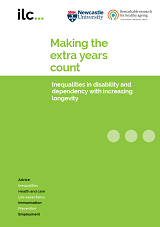Making the extra years count – Inequalities in disability and dependency with increasing longevity

The UK Government’s target to add five additional healthy years to the average UK lifespan by 2035 is now likely to be re-evaluated as a result of the COVID-19 pandemic. Despite recognising that the benefits of an ageing society can only be delivered if people live not only longer buy healthier lives, ill health and disability in on the increase.
This ILC research project, led by Newcastle University and funded by The Dunhill Medical Trust, investigates the trends in longevity, disability, and dependence between 1991 and 2011, and explores how these trends related to long-term conditions and socioeconomic inequalities.
The research has found key findings, including:
- Many measures of life expectancy have improved over the past decades for both men and women.
- At the same time, ill health and disability have been increasing while the proportion of life spent in good health and free from disabilities has been declining.
- Inequalities between socioeconomic groups in terms of life expectancy without disabilities at age 65 tripled between 1991 and 2011.
These elements support the findings of ILC’s Prevention in an ageing world programme and the recommendations for action, including:
- Democratise access to prevention to alleviate health inequalities
- Inspire and engage policymakers, healthcare professionals and individuals to consider, support and access prevention
- Use technology effectively
